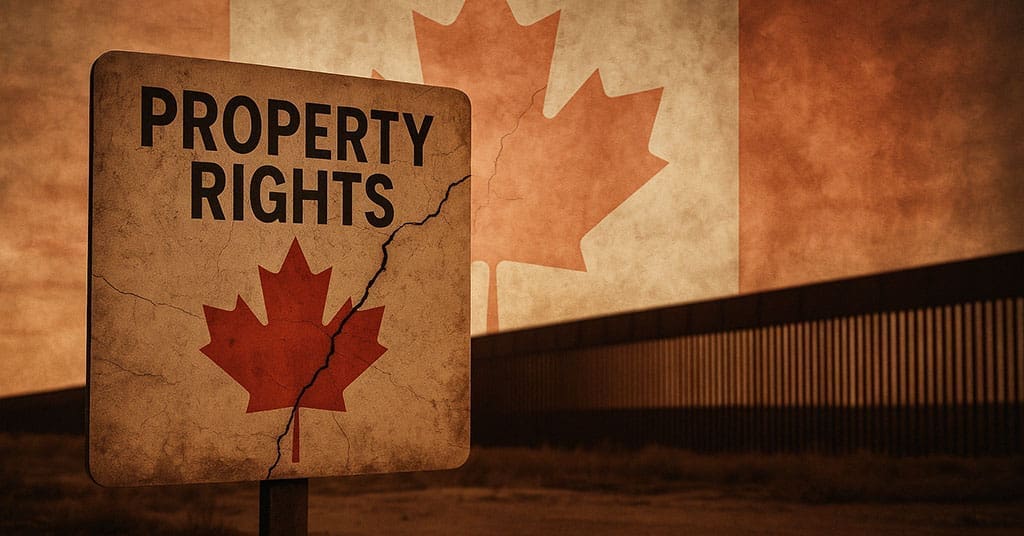Canada must strengthen property rights to secure its economic prosperity

For interview requests, click here
Canada’s economic future is at risk. With a second Trump administration pushing aggressive protectionist policies, Canada is losing ground where it matters most—property rights.
As American markets become more protectionist, Canada must ensure it remains attractive to investors and innovators. Strong property rights are essential to maintaining that competitive edge. Without them, businesses hesitate, landowners face uncertainty, and innovation slows. If Canada does not act, it risks falling further behind global competitors.
A useful tool for assessing property rights worldwide is the U.S.-based Property Rights Alliance’s International Property Rights Index (IPRI), which ranks more than 100 countries based on legal protections for property ownership. The 2024 IPRI ranks Canada 16 overall and second in North America, behind the United States.
The index evaluates countries based on three factors: the legal and political environment, physical property rights, and intellectual property rights. Canada’s ranking in the 2024 report represents a slight decline from 2023.
The IPRI found Canada’s score dropped in the legal and political category, which measures judicial independence, commitment to the rule of law, political stability, and control of corruption. However, its physical and intellectual property rights indicators improved slightly.
While this remains a strong position, Canada is now at the bottom of this elite group. Without action, its ranking will continue to slip—along with its economic standing. Property rights and prosperity are strongly linked, with countries in the top 20 per cent of the IPRI enjoying, on average, per capita incomes 19 times higher than those in the bottom 20 per cent.
If Canada fails to act, it risks losing its economic edge.
Canada’s decline isn’t just relative to global leaders—it is also falling behind its closest economic and legal peers. Among the Anglosphere nations—New Zealand (7), Australia (8), the United States (14), and the United Kingdom (15)—Canada ranks last.
On legal and political indicators, Canada performs well, ranking high in judicial independence, rule of law, stability, and low corruption. Its physical property rights protections are also strong but still trail behind New Zealand and Australia.
A key driver of modern economies is intellectual property, but in this area, Canada lags. While the Anglosphere countries perform similarly in this category, Canada falls behind in trademark and copyright protection. These weaknesses matter because intellectual property rights help commercialize innovation and drive economic productivity.
Stronger patent protections in the pharmaceutical sector, for instance, could boost medical advancements and industry growth. Meanwhile, American industry groups frequently criticize Canada’s weak enforcement against counterfeit goods at the border. Additionally, Canada has not done enough to combat online piracy, which undermines content creators and businesses.
To reverse course, Canada must tighten expropriation laws, strengthen compensation requirements, and crack down on intellectual property violations. By contrast, New Zealand has an efficient system for transferring property titles and strict laws requiring compensation for expropriations.
Canada, however, allows de facto expropriations, where governments restrict land use or property rights without providing compensation. This weakens security for landowners and discourages investment. The top-ranked IPRI countries—including Finland, Singapore, Denmark, the Netherlands, Luxembourg, and Sweden—provide stronger compensation rights, even in cases of partial expropriation.
Strengthening property rights will require cooperation at all levels of government. While most property laws fall under provincial, territorial, and municipal jurisdiction, intellectual property is federally regulated.
Still, all three levels of government can work together to improve protections for property owners. They must establish stricter standards for expropriation, ensure fair compensation when government regulations lower property values (regulatory takings), and crack down on intellectual property violations to protect Canadian businesses.
With a second Trump administration prioritizing American interests, Canada cannot afford to be complacent. Stronger property rights will protect investment, encourage innovation, and ensure economic stability in an increasingly unpredictable global economy.
The time to act is now.
Joseph Quesnel is a Senior Research Fellow with the Frontier Centre for Public Policy.
Explore more on Property rights, Canadian economy
The views, opinions, and positions expressed by our columnists and contributors are solely their own and do not necessarily reflect those of our publication.
Troy Media is dedicated to empowering Canadian community news outlets by providing independent, insightful analysis and commentary. Our mission is to support local media in fostering an informed and engaged public by delivering reliable content that strengthens community connections, enriches national conversations, and helps Canadians better understand one another.



